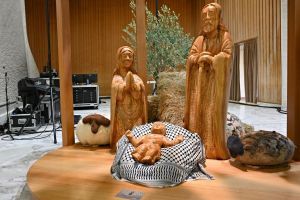Erasing Jesus from Israel

The bishops of the African Methodist Episcopal Church harshly condemned Israel over the Hamas War, exceeding even the usual intemperance of white progressive Mainline Protestant denominations. It accused Israel of waging “torture” against the Palestinians of Gaza followed by “murder,” with American weapons. They urged the U.S. to end all support for Israel. They accused Israel of disregarding Palestinian human dignity since 1954. And they accused the U.S. of supporting Israel’s “mass genocide.” They condemned “all violence as a means of resolving this conflict.” And they lamented the “tools of empire, colonialism, and domination,” while extolling their “solidarity with Jesus Christ of Nazareth, a Palestinian Jew.”
This statement was very unfair and very stupid. When dealing with terror strikes like October 7, what are the alternatives to “violence?” Critiques are easy. What are the constructive alternatives? If the communities of these bishops were attacked with murder, rape, and kidnapping, what would they urge? What would they expect of their government? What does historic Christian teaching offer on this topic?
Surely more than platitudes.
When church leaders speak to society, they should do so soberly and constructively, reflecting the gravitas of their office. Did the bishops actually write this statement? If not, who did? Was there any serious conversation among them? And to what extent if any do AME members agree? The AME, like other historic black denominations, and like the white Mainline Protestant denominations, is declining, as more American Christians of all races gravitate towards nondenominational churches. This shift is understandable.
Meanwhile, Sojourners, a storied Religious Left journal that continues its descent into post-Christian extremism, published an article insisting Jesus was Palestinian. The author, who identifies as a Quaker Palestinian in North Carolina, lamented “various fictional accounts found in the Bible, like the story of the Exodus, which some use to justify Zionism and the current apartheid.” And he claimed a “consensus among scholars that the Bible is not a history book,” but “Western Christians still refer to the Bible for ‘historical accounts’ of Palestine.” Correction: the vast majority of over two billion Christians, most of them outside the West, still heed the Bible as history, including the Exodus of the Hebrews from Egypt to the Promised Land.
In this Sojourners account, Jesus is not Palestinian ethnically or historically but in a spiritual sense as an oppressed indigenous person under imperial rule. Supposedly this interpretation “both honors his Jewish identity and emphasizes his profound role as a liberator within the specific context of Palestine.” In this way, “Jesus is not merely a symbol of liberation in the abstract; he is a direct ancestor, a beacon of resistance whose life under occupation mirrors the ongoing plight of the Palestinian people.”
Of course, the author cites Israel’s “unfolding genocide in Gaza.” He explains that claiming Jesus as a Palestinian “affirms a historical truth and resists the narratives that seek to erase our presence and legitimacy in our land.” By preaching “liberation and justice in the face of imperial tyranny,” Jesus is a “direct ancestor of the Palestinian people.” He concludes that “it’s deeply troubling to witness a religion that emerged under occupation being used to justify the modern occupation that we are currently experiencing.”
This Sojourners author, by denying the Bible’s historicity, especially of Exodus, loses all credibility as a Christian author. But it’s instructive that he feels the need to do so in his reinterpretation of an ahistorical Jesus who is a metaphor for political liberation. Needless to say, there’s no attempt by the author to understand why Jews feel attached to their homeland. Nor is there self-reflection about how destructive nonnegotiable Palestinian nationalism has been for Palestinians.
The AME bishops, echoing the Sojourners author, call Jesus a “Palestinian Jew.” Would Jesus have understood Himself in this way? He never referred to it, and Palestine is never cited in the New Testament. Roman soldiers mocked Jesus as “King of the Jews.” He was from Judea. Hebrews of His time did not refer to their land as Palestine. Jesus may as well be called an Assyrian or an Ottoman. For Christians, Jesus is the Savior of the world. But we don’t call him an American or a Chinese. Calling Him the former would elicit calls of Christian Nationalism, and justifiably. His exclusive nationality was Hebrew. And He belongs to all who call upon Him and claim Him as Lord.
Denying or minimizing Jesus’s Jewishness is unhistorical. It also leads to erasing the Jewish people historically and politically, a project Jesus would not support. Jesus does not give His followers detailed counsel on contemporary politics. Christians seek dignity for all people. Dignity for Israelis or Palestinians seems impossible from the perspective of Hamas, which wages endless war against the Jews and wants their eradication. How does a nation deal with enemies who seek its destruction? It is only through “nonviolence?” The AME bishops suggest so. But serious people know otherwise. And decent people know that erasing Israel, as the Sojourners author suggests, is morally unacceptable.
Christians living in America operate from safety and privilege. It’s easy to dispense critique of others in more dire situations. But church leaders and ostensibly Christian publications should strive to be sober, about all public affairs, and especially about Israel, from which our Lord emerged.
Originally published at Juicy Ecumenism.




























